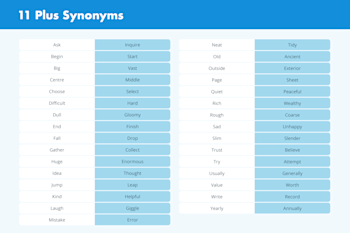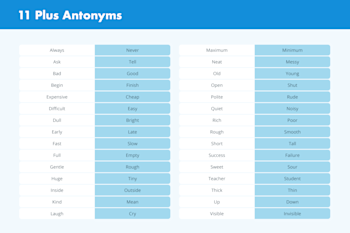11 Plus vocabulary and spelling list

For over 20 years we have supported over 50,000 children through their 11 Plus exams with our amazing tuition and resources, like our 11 Plus vocabulary and spelling list.
One of the elements that benefit children the most is having a rich vocabulary. There are many verbal reasoning and English questions that focus on synonyms, antonyms or interpreting the meaning of a text. All of these require a strong knowledge of words.
Find out how you can help your child with the exam with our handy 11 Plus vocabulary guide.
11 Plus vocabulary list
Have a look at some of the words used in CEM 11 Plus and GL exam boards over recent years. It would be possible to list many thousands of words but the selection below showcases the kind of unusual language your child might encounter.
Would your child know what these words mean?
abhorrent
impeccable
jocular
rancour
embellish
banal
frivolous
intrepid
porous
frail
stout
emulate
placate
cantankerous
meagre
dawdle
ample
commotion
stagnant
vague
The importance of a rich vocabulary in the 11 Plus exam
The 11 Plus English exams come in a variety of formats, depending on the local area and the school requirements. However, they will include sections on creative writing, spelling and comprehension. For writing and 11 Plus comprehension tasks, having a good understanding of 11 Plus vocabulary will help your child succeed.
11 Plus spelling and vocabulary
The 11 Plus English exam requires your child to:
Recognise errors
Identify terms
11 Plus Vocabulary – Verbal Reasoning
The 11 Plus verbal reasoning section of the exam relies on a strong vocabulary that goes beyond the primary curriculum. Therefore, a good understanding of 11 Plus vocabulary is vital.
Verbal reasoning includes:
Word problems
Vocabulary knowledge of synonyms, antonyms and analogies
11 Plus Vocabulary – Synonyms and Antonyms
In the exam, your child may need to write in a variety of styles including letters, diaries, essays, articles and continued texts. They will also need to analyse a variety of texts including poetry, play scripts, descriptive and narrative texts. Recognising lots of synonyms and antonyms will help them with both comprehension and being creative in their writing.
Synonym: A word that has the same meaning as another word of phrase.
Antonym: A word that has an opposite meaning to another word.

How to enrich your child’s vocabulary
Enriching the vocabulary isn’t a one-off task, instead, it’s a continuous process. We’ve put together a simple guide that will help your child improve their 11 Plus vocabulary. See the guide below:
A lot of reading
Words tend to stick when you read them or hear them being used. So the primary thing to do when building your 11 Plus vocabulary is read, read, read (and when you’re not reading – listen to some audiobooks!)
Diverse reading material
Reading material should be as varied as possible. Mix fiction and non-fiction, try out different authors, genres, books from different cultures and definitely get acquainted with the classics. Diversity in the reading material helps to expand your vocabulary.
Download Explore Learning’s 11 Plus reading list
Download our 11 Plus reading list
The classics have the answers
11 Plus exams are often known for presenting children with words that are rarely used today but if you pick up a book by Arthur Conan Doyle you’ll probably find them all!
Link reading to popular TV shows and films
Reading should be engaging and entertaining. You want to keep the love of reading alive so work to find books that pique your child’s interest. Sometimes finding a book related to something they’ve recently watched on TV or a film can be a good entry into it.
Create 11 Plus vocabulary cards
Vocabulary cards can be a great way to memorise new words and definitions. Encourage your child to create these cards, this will make it easier to refer back to any new words they came across.
Use a thesaurus
Since many vocabulary questions are linked to identifying words of the same or opposite meaning it’s really good to look them up in a thesaurus and record some synonyms and antonyms alongside them.
Use your newly found words
Challenge yourself and your child to use new words as soon as possible. This will help your child memorise and familiarise themselves with new words faster.
Play 11 Plus vocabulary games
There are so many great word games you can play as a family such as Scrabble, Bobble and Bananagrams that keep your 11 Plus vocabulary acquisition fun. You might encourage your child to try daily word searches, crosswords and try out some vocabulary apps such as Word Cookies and Wordscapes.
Use 11 Plus vocabulary worksheets and practice papers
Practicing answering the types of English and vocabulary questions that may come up in the exam can help your child to become comfortable with the format, whilst getting familiar with new words along the way.
Our free 11 Plus learning resources include practice questions and papers to get you started.

11 Plus synonyms and antonyms list
We’ve put together a list of synonyms and antonyms that we believe your child should know ahead of their 11 Plus exam.
Synonyms

Antonyms

Best practice books for 11 Plus
Looking for some more help and resources to stretch your vocabulary?
Try some of these books:
Warhorse – Michael Morpurgo
Charlotte’s Webb – E.B White
Jane Eyre – Charlotte Bronte
Tom Sawyer – Mark Twain
Tess of the D’Urbervilles – Thomas Hardy
Rose McGowan – 11 Plus Vocabulary
Alternatively, check out our recommended primary school reading list for children.
Best 11 Plus vocabulary apps to try
We all know that all people learn differently. If your child responds better to digital learning formats, try these vocabulary apps:
Word of the Day by Vocab Ninja (free for Apple)
Word Cookies (Apple and Google Play)
Wordscapes (Apple and Android)
Vocabulary Builder by Magoosh (free for Apple and Android
11+ Vocab Builder by Eleven Plus Exams (£3.99 for Apple)
Preparing for 11 Plus vocabulary tests
A great way to enhance your child’s vocabulary is to get them some 11 Plus tutoring support. An expert 11+ tutor can help to build their confidence with English and challenge them with tailored learning content and advice. Whether it’s in a small group setting or individual tutoring online – a tutor can help them tackle any difficulties and give them the best chance of success.
11 Plus at Explore Learning
There is more to 11 Plus exam preparation than just developing a rich and strong vocabulary. At Explore Learning we’ve developed a comprehensive curriculum tailored to the requirements of your local school entrance exams. Work with dedicated tutors to practise speed, hone accuracy and master exam techniques.

If your goal is to pass the 11 Plus, Explore Learning can support you every step of the way into grammar school. Find out more about our 11 Plus exam tuition.
Ready to take the next step?
Our tutors are here to support you before, during and after the exam. So why not find out about how we can help your child with their education?
Cancel anytime
No joining fee
In centre or online
Memberships to suit you
Cancel anytime
No joining fee
In centre or online
Memberships to suit you
Cancel anytime
No joining fee
In centre or online
Memberships to suit you
11 Plus vocabulary and spelling FAQs
How Can I Improve My Child's Vocabulary For 11 Plus?
To improve your child’s 11 Plus vocabulary, it’s essential to blend consistent practice with diverse reading habits. At Explore Learning, we advocate for regular engagement with vocabulary exercises in our tailored 11 Plus tuition programme.




